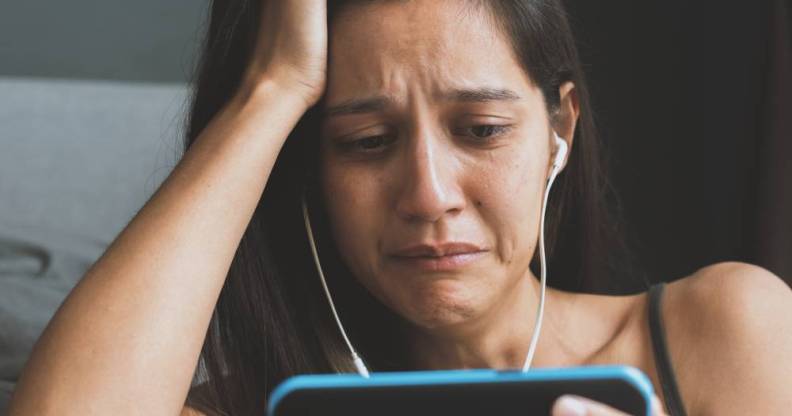Shocking extent of anti-LGBT+ and racist trolling laid bare by eye-opening report

(Envato Elements)
Two-thirds of LGBT+ Americans have experienced severe online hate and harassment, with Asian and Black Americans seeing major rises in the past year as well.
A survey of over 2,200 Americans released on Wednesday (24 March) by the Anti-Defamation League (ADL), an anti-hate speech organisation, revealed that LGBT+ people reported higher rates of online harassment than other demographics.
The organisation defined severe online hate as comprising of sexual harassment, stalking, physical threats, swatting (placing a false call for an emergency service against a victim), doxing (publishing a person’s private and/or identifying information online) and sustained harassment.
According to the ADL, 64 per cent of LGBT+ people reported experiencing online hate and harassment. This has steadily been increasing over the three consecutive years the ADL has been conducting the survey.
Over a quarter (28 per cent) of ADL’s survey respondents also reported racist harassment, compared to 25 per cent recorded a year ago.
Asian-Americans experienced the largest single year-on-year rise in severe online harassment, with 17 per cent reporting it this year compared to 11 per cent in 2020.
The survey’s release comes as the Asian-American community is experiencing a rise in real-world violence including the murders of six Asian women working at massage parlours in Atlanta, Georgia.
Reporting forum Stop AAPI Hate revealed nearly 3,800 anti-Asian racist incidents were reported over the last year during the pandemic. This was significantly higher than the 2,808 hate incidents reported last year.
Jonathan A Greenblatt, chief executive of the ADL, said the rise in online hate and harassment against Asian-Americans was sadly unsurprising given the false rhetoric that Asian people played a role in spreading COVID.
“Not surprisingly, after a year where national figures including the president [Donald Trump] himself routinely scapegoated China and Chinese people for spreading the coronavirus, Asian-Americans experienced heightened levels of harassment online, just as they did offline,” Greenblatt said.
Black Americans also reported experiencing a sharp rise in racist incidents online. Fifty-nine per cent of Black Americans who responded to the survey said they experienced online hate, compared to 42 per cent who said the same last year.
This follows a year of protests highlighting racial injustice in America after the murders of George Floyd, Breonna Taylor and other Black Americans by police officers.
The majority (81 per cent) of Americans believed that social media platforms should do more to combat online hate. Three-quarters (77 per cent) thought legislation needed to be introduced to hold social media platforms accountable for recommending users join “extremist groups”.
Of those who said they were harassed online, 75 per cent experienced hate on Facebook, followed by 24 per cent on Twitter. A similar number (24 per cent) of Americans experienced online harassment on Instagram, and 21 per cent said they experienced hate on YouTube.
The ADL called for reform of section 230 of the Communications Decency Act. The law protects social platforms for content posted on platforms, but the loophole has been a hot button issue for both Democrats and Republicans.
The report comes as the bosses for the top tech companies – including Google, Facebook and Twitter – have been called to appear before Congress to address the rising spread of hate speech and misinformation on online platforms.
The hearing was announced in February after the Senate cited concerns that online platforms “have allowed misinformation to spread, intensifying national crises”. The Senate specifically cited concerns that Facebook, Twitter and Google-owned platforms were used to spread “falsehoods about the COVID-19 vaccine” and “debunked claims of election fraud”.
The meeting was announced just a few weeks after it was revealed that pro-Trump extremists who stormed the US Capitol were found to have organised on social media platforms weeks in advance.

